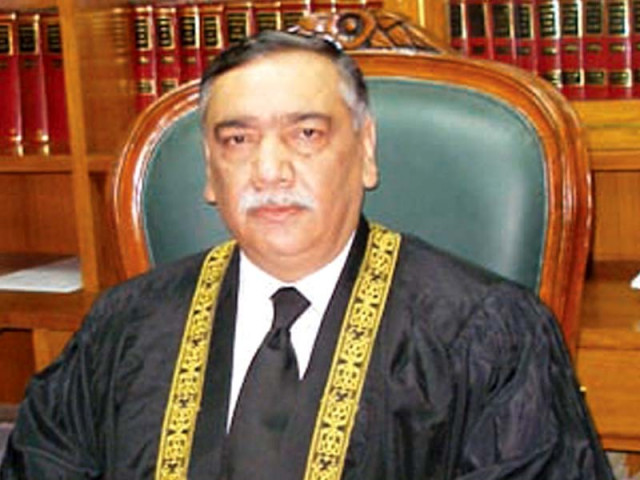Musharraf, Justice Isa cases in focus as CJP Khosa’s retirement looms
Special court reserves verdict in Musharraf treason case, will announce it on Nov 28

Justice Asif Saeed Khosa. PHOTO: EXPRESS
Justice Khosa, who is retiring on December 21, has rendered verdicts against political and judicial functionaries.
In the National Reconciliation Order (NRO) case, he was part of a seven-judge larger bench which had disqualified former prime minister Yousuf Raza Gilani in 2010. He had also written an additional note in the Gilani disqualification verdict. Also, Justice Khosa had headed the larger bench that had heard the Panama leaks case in 2017, becoming the first judge to disqualify former prime minister Mian Muhammad Nawaz Sharif under Article 62 (1)(f) of the Constitution.
CJP Khosa has also issued judicial verdicts against two high court judges. As a member of the Supreme Judicial Council, he authored the opinion on the removal of Islamabad High Court judge Shaukat Aziz Siddiqui. However, he did not investigate Siddiqui’s allegations regarding the manipulation of judicial proceedings in Panamagate.
Opinion is divided on his judicial verdicts. One section of lawyers believes that the security establishment has become stronger during his tenure as he did not take note of 'lopsided accountability' in the country.
However, another section of lawyers believes Justice Khosa played a crucial role in activating the treason trial against Pervez Musharraf and that history would remember his role.
A special court led by Peshawar High Court Chief Justice Waqar Ahmad Seth and comprising Justice Nazar Akbar and Justice Shahid Karim is all set to announce the verdict in the treason case against Musharraf on November 28, having reserved the verdict in the case.
The treason case had been initiated in November 2013 months after the PML-N government had come to power. The trial has remained pending due to several reasons. The three-judge special court, led by Justice Faisal Arab, had on November 21, 2014 directed the federal government to include the names of Zahid, former prime minister Shaukat Aziz and former chief justice Abdul Hameed Dogar as the co-accused in the treason case.
The proceedings had been suspended for a couple of years because of that order. In February 2016, the Supreme Court, led by CJP Khosa, had set aside the special court’s order by directing that the trial against Musharraf be concluded.
In the meantime, the former army chief had gone abroad for medical treatment. Several judges who had been part of the special court have either retired or been elevated in the apex court.
Soon after taking charge as the CJP, Justice Khosa had taken up the matter regarding the delay in the trial. He had, on March 25, referred to the punishment given to dictator Oliver Cromwell whose skeleton had been hanged after his death, observing that an accused was deliberately not appearing before the trial court and questioning if the court was helpless.
In April, a three-member bench led by the CJP himself had directed the special court to proceed in accordance with the law by concluding the matter. It had held that, if the accused failed to turn up, he would lose his right to an audience. Following the SC’s decision, the matter had proceeded in the special court.
After the retirement of Justice Tahira Safdar, the CJP had nominated outspoken judge Justice Waqar Ahmad Seth to preside over the special court. The Peshawar High Court (PHC) chief justice’s bold verdicts have also irked the security establishment. The same judge had also set aside trials of military courts’ convicts, and his judgment had also rescued Pakistan before the International Court of Justice (ICJ) in the Kulbhushan case. Recently, the PHC CJ declared unconstitutional the functioning of scores of internment centres in Khyber Pakhtunkhwa.
Legal experts are unanimous that, other than special court judges, history will credit CJP Khosa for activating the treason trial against the military ruler.
Likewise, one section of lawyers believes that the CJP’s retirement will also be significant in determining the fate of Justice Isa, who is facing a presidential reference for not disclosing his family’s properties in his wealth statement. Justice Isa has accused the CJP of being biased against him. The matter is still pending.
Government functionaries want the case against the SC judge to be decided during the incumbent CJP’s tenure. On the other hand, representatives of superior bars want the matter to be decided after the chief justice’s retirement.
A senior lawyer has predicted that the Musharraf case would be decided but the Justice Isa case would remain pending. Even Justice Isa’s legal team has said that it believed it would be impossible for the full court to decide the case by December 21.
A bar representative has said that lawyers always supported ‘courageous judges’ and that Justice Khosa was respected for his bold rulings. Likewise, he stated that the superior bars are also backing Justice Isa in the interest of the institution. “Justice Isa is also believed to have rendered courageous verdicts against the security establishment and his removal will encourage undemocratic forces in the country”, he added.



















COMMENTS
Comments are moderated and generally will be posted if they are on-topic and not abusive.
For more information, please see our Comments FAQ